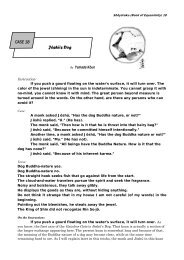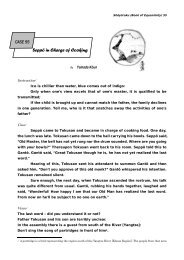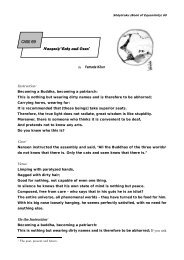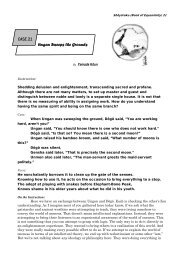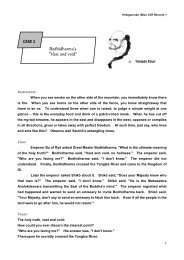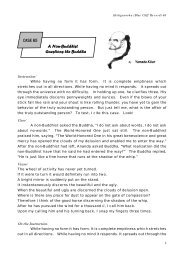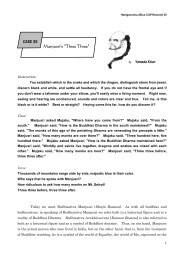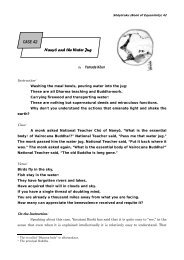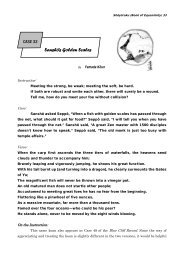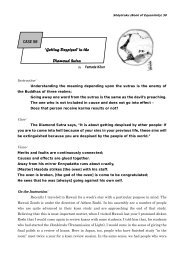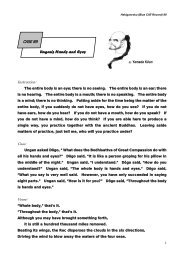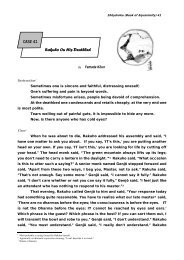English.pd
English.pd
English.pd
Create successful ePaper yourself
Turn your PDF publications into a flip-book with our unique Google optimized e-Paper software.
awakening through the mental concentration developed in his practice of swordsmanship.<br />
I would never deny that incredible powers of concentration are required for this and other<br />
arts. The same holds for the art of kyûdô. Focusing our entire spirit on the target requires<br />
great powers of concentration. But enlightenment does not result directly from that<br />
concentration of spirit. However, if we concentrate our spirit on something without form<br />
within us, enlightenment will result.<br />
The text speaks in terms of dhyana [concentration of spirit] and prajna [enlightened<br />
wisdom]. Nevertheless, as just mentioned, the wisdom of satori cannot appear without the<br />
power of concentration of mind. But satori awakening does not result from just any sort of<br />
concentration of the spirit. Even a master swordsman like YAMAOKA Tesshû of the Meiji<br />
Period had to practice zazen under the guidance of a Zen roshi. Thus we can be perfectly<br />
and completely endowed with dhyana and the wisdom of enlightenment. The satori which<br />
appears from concentrating our entire spirit on something without form within us is<br />
endowed with the wisdom which allows us to see the actual world. And this world does not<br />
move in the least, no matter how difficult the circumstances. For example, if we are in a<br />
life-and-death situation where death could come at any moment, it does not move at all:<br />
"With bright completeness of dhyana and prajna, I never lose my equanimity."<br />
That's easy enough to say, but no easy thing to put into practice. Kaisen Oshô of Eirinji<br />
Temple said: "Mind and body let go, even fire is cool." It is said that he uttered these words<br />
while being burned to death on the temple veranda. This originally came from a Chinese<br />
poem with the following lines: "Zazen does not always need mountains and rivers: Mind<br />
and body discarded, even fire is cool" (Tojunkaku, 6cCE). This is possible if we are truly<br />
endowed with the "bright completeness of dhyana and prajna." But I doubt that even a<br />
single person in Japan today is capable of such concentration of spirit. Even though you<br />
have the eye of satori, if you do not have the power issuing from concentration of spirit you<br />
cannot do it. Likewise, if you only have the power of concentration of spirit and have not<br />
yet grasped the truth in the wisdom of satori, you cannot do it either. It is only when both<br />
are present that it becomes possible. Some years back, we read how monks and nuns in<br />
Vietnam committed self-immolation by pouring gasoline on themselves and setting<br />
themselves on fire in protest. Such an act is only possible with the power of zazen. When<br />
Yôka Daishi says, "with bright completeness of dhyana and prajna I never lose my<br />
equanimity," he is speaking of his own world.<br />
If the sun becomes cold, and the moon hot, even a host of demons<br />
cannot shatter the truth. It's normal for the sun to be hot and the moon to be cool.<br />
The expression here is like saying, "when the river starts flowing upstream." Even in a<br />
totally abnormal state where the sun has become cold and the moon hot, and no matter<br />
16



